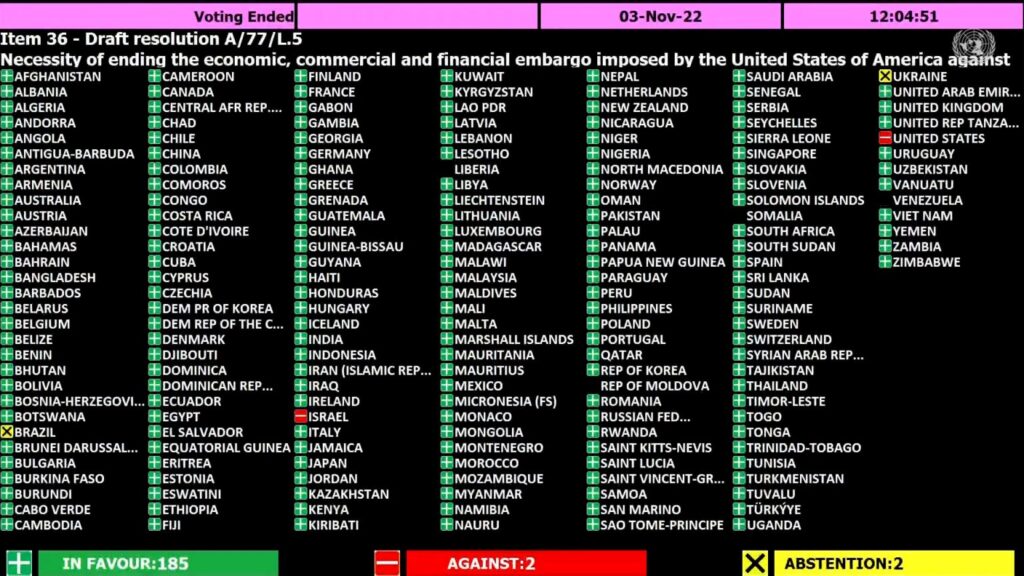
USA vs the world: Blockade on Cuba opposed by 97% of countries at UN
US officials frequently talk about the “rules-based international order”, and label other countries as “rogue states” if Washington doesn’t like their policies.
But a look at votes in the United Nations clearly shows that the United States consistently opposes the will of the entire international community.
The world saw a striking example of this on November 2, when almost every country on Earth supported a UN General Assembly resolution that called to end the US embargo against Cuba.
Only two countries voted against the measure: the United States and Israel.
Just one country abstained: Ukraine.
 The world has for the most part voted the same way for 31 consecutive years.
The world has for the most part voted the same way for 31 consecutive years.
In 2022, the vote was 185 to two, with two abstentions. At that time, Brazil was ruled by far-right, pro-US leader Jair Bolsonaro, who abstained. But now that Brazil’s left-wing President Lula da Silva is back in power, he has joined with the rest of the international community in opposing illegal US sanctions.
The US goal in Cuba: “hunger, desperation, and overthrow of government”
Washington has maintained a suffocating blockade against Cuba for more than 60 years. This has starved the country of an estimated $159 billion, or approximately 150% of Cuba’s entire GDP.
The US embargo prevents Cuba from importing certain technologies, machine parts, medicines, and even foods, despite Washington’s misleading claim to have “humanitarian exemptions” – a rhetorical sleight of hand that in reality does not apply when foreign firms are afraid of secondary sanctions and therefore do not bother the risk of trading with Cuba.
Illegal US sanctions make it exceedingly difficult for Cuba to get access to international financing, and cut off communication with many risk-averse foreign banks.
The US blockade has directly contributed to many preventable deaths of Cubans, who have perished because their country was not able to import specific medicines, medical equipment, or machine parts that were needed to treat them.
Washington’s goal behind this criminal blockade is very clear: “to bring about hunger, desperation, and overthrow of government”.
In an internal State Department cable from 1960, the year after the triumph of the Cuban Revolution led by Fidel Castro, top US diplomats regretfully conceded that “the majority of Cubans support Castro” and “there is no effective political opposition”.
The US State Department therefore concluded:
The only foreseeable means of alienating internal support is through disenchantment and disaffection based on economic dissatisfaction and hardship.
If the above are accepted or cannot be successfully countered, it follows that every possible means should be undertaken promptly to weaken the economic life of Cuba. If such a policy is adopted, it should be the result of a positive decision which would call forth a line of action which, while as adroit and inconspicuous as possible, makes the greatest inroads in denying money and supplies to Cuba, to decrease monetary and real wages, to bring about hunger, desperation and overthrow of government.
Illegal US blockade has starved Cuba of $159 billion – roughly 150% of GDP
Cuba’s Foreign Ministry published a report for UN member states in July 2023, which detailed how illegal US sanctions have devastated the country.
In the year from March 1, 2022 to February 28, 2023, Cuba estimated that the US blockade caused losses of $4.87 billion, or around $13 million per day.
This is a massive economic blow for a small island nation whose GDP is just over $100 billion.
Cuba calculated that, “At current prices, the accumulated losses during the over 60 years of application of this policy amount to USD 159,084,300,000”, or roughly 150% of GDP.
Moreover, Havana said GDP growth in 2022 would have likely been 9%, were it not for the illegal US embargo.
“The blockade directly causes extreme harm through the combined effects of its various measures, pursuing its cruel, practical aim of depriving the country of the inflow of funds essential for the purchase of food, supplies, equipment, spare parts, technologies and software”, the report stated.
“No other nation has been obliged to take on a social and development program under such conditions of prolonged systematic
hostility on the part of the greatest power in human history”, the Cuban government wrote.
“The blockade constitutes a massive, flagrant and systematic violation of the human rights of all Cubans. By reason of its express purpose and the political, legal and administrative structures on which it is based, it constitutes an act of genocide under the 1948 Convention on the Prevention and Punishment of the Crime of Genocide”, Havana added.
Cuba noted that more than 80% of its current population has no idea what life is like without the US blockade.


